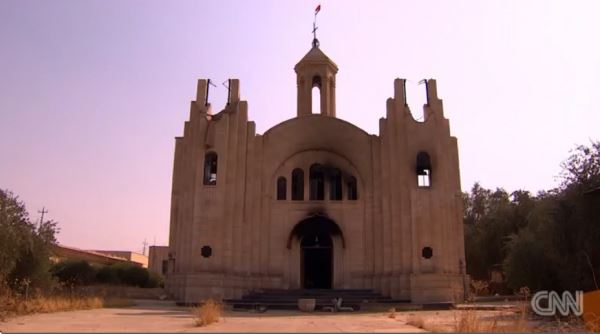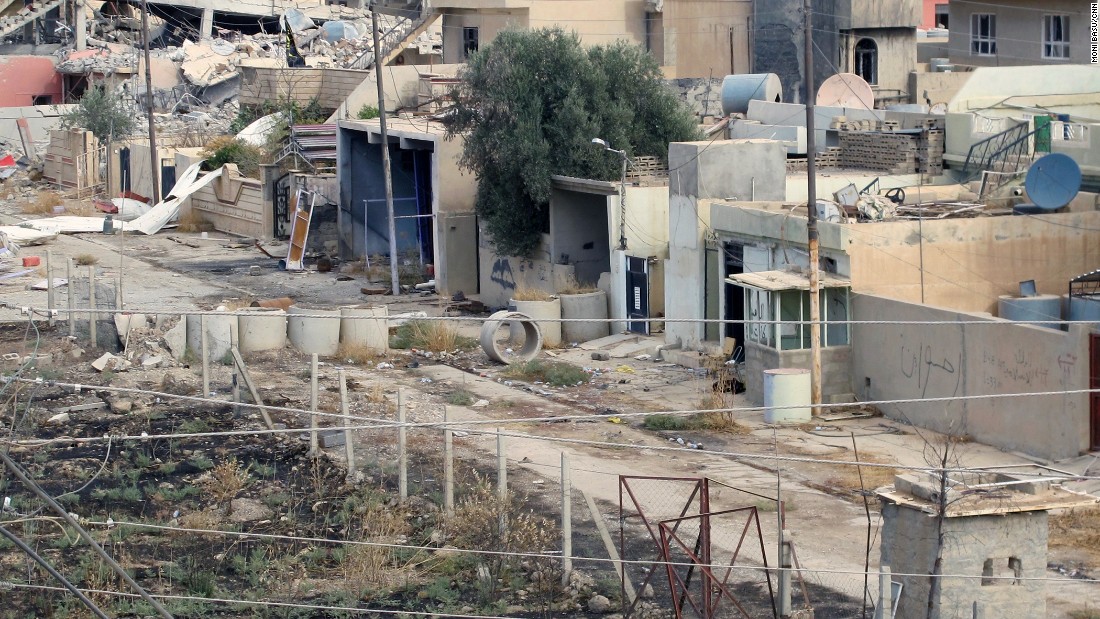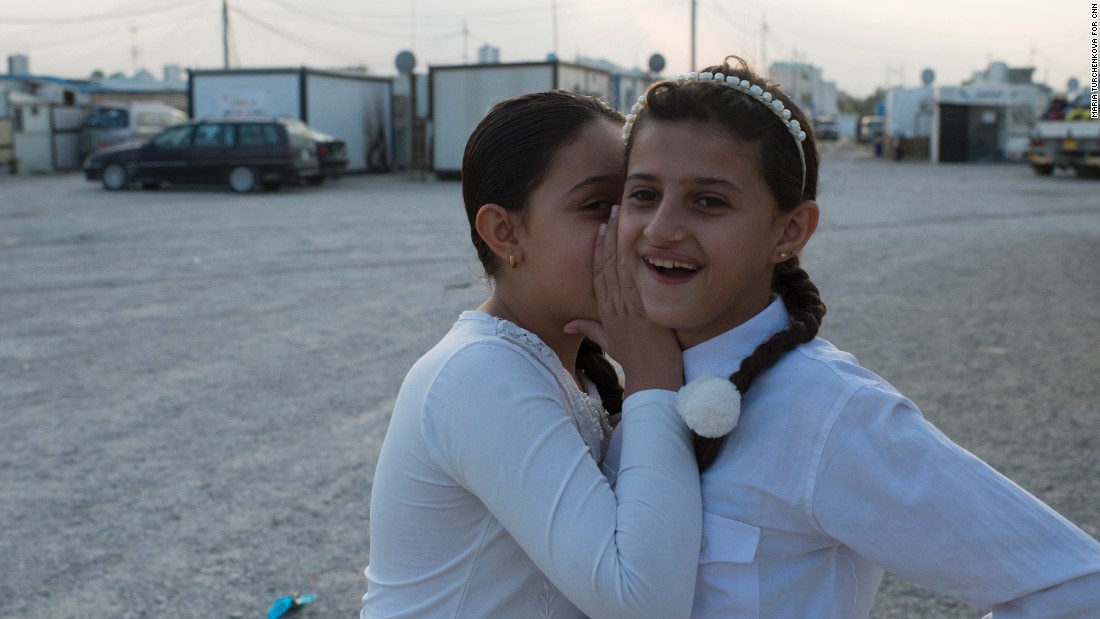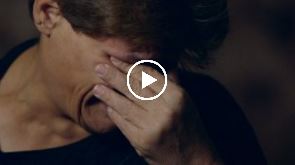
Source: CNN
02:08In biblical lands of Iraq,
Christianity in peril after ISIS
____________
By Moni Basu, CNN
Updated 2109 GMT (0509 HKT) November 20, 2016
Bartella, Iraq (CNN) Behnam Lalo crunches over jagged glass and tiptoes around a fallen altar, burned Bibles and a decapitated porcelain Virgin Mary. He picks up a cross from a heap of rubble and wipes away ashes with his priest's robes.
He recognizes the cross immediately; he used it at confirmation ceremonies of so many boys and girls here at St. George Church. He no longer knows where some of them are. Or, if they are still alive.
This was a sanctuary once, a place of peace and love in the northern Iraqi town of Bartella, just 13 miles east of Mosul. Now everything is in disarray -- defaced and damaged, covered in soot and remnants of war. In the adjoining cemetery, a rocket launcher points east toward the front lines, and bullet-ridden gravestones stand as silent witnesses to the desecration.
A crushing sadness descends on Lalo.
He tightens his grip on the small cross as his face fills with resolve. He will build again with new bricks and mortar, replace pillaged pews and find a chandelier more beautiful than the one he had installed a few years ago.
With few resources, rebuilding is sure to be a challenge. But Lalo knows that's the easy part. How will he be able to restore faith in this fractured land?
The Bible tells followers not to judge others. "Forgive, and you will be forgiven," it says. Those words, Lalo believes, are at the very core of Christianity.
But after everything that has happened in Iraq, Lalo sees hatred in the hearts of the people. It will be almost impossible to forgive the militant men of the self-proclaimed Islamic State who shattered thousands of lives. Or live again in these ancient lands where Christianity came early but is now edging dangerously close to extinction.
Mosul was once a diverse and tolerant city
Taqla Gigiyun cannot stop sobbing at the thought of everything that ISIS destroyed in the Christian towns of northern Iraq.
'Life can never be the same'
On October 17, Iraq launched a major military campaign to defeat ISIS in Mosuland surrounding Nineveh province. Lalo followed each battle closely, as did all the others in Ankawa, a Christian enclave in Irbil where Lalo and thousands of other displaced people have been living since 2014.
The following evening, as Iraqi forces fought militants in the Christian towns of the Nineveh Plains, impromptu celebrations erupted on the streets of Ankawa.
Lalo felt hope rising in his heart. Perhaps he would be able to go home soon.
A few days later, on his 49th birthday, news of Bartella's liberation reached Lalo.
The violent booms of war went quiet, and for the first time in more than two years, church bells pealed, the sounds echoing like a dirge through the ravaged and empty town.
It was the greatest gift in Lalo's lifetime, but bittersweet.
Life in Bartella, as he knew it, stopped suddenly and brutally in the summer of 2014. ISIS blitzkrieged its way into northern Iraq, taking control of Mosul, Iraq's second-largest and once its most diverse city.
02:16
ISIS marked Christian houses with the Arabic equivalent of the letter "N" for the derogatory term Nazarene. The militants blared ultimatums from the loudspeakers of Mosul mosques: Leave by July 19 to avoid death or forced conversion to Islam.
The terror-driven exodus emptied the city of Christians,Yazidis and other religious minorities. A decade ago, 35,000 Christians lived in Mosul. Now maybe 20 or 30 remain.
Three weeks later, ISIS repeated its scourge in the towns and villages in surrounding Nineveh province, the historical homeland of Iraqi Christians. Many had sought refuge here from persecution in other parts of the country, especially after the 2003 US-led invasion gave rise to sectarian strife.
Lalo was not at home when ISIS fighters overran Bartella on August 8, 2014. He'd gone to Baghdad on church business and was in the Kurdish capital of Irbil on his way home when he began to hear about families fleeing Bartella and other Christian towns such as Qaraqosh, Baghdida and Tal Kayf.
The people who escaped ISIS told Lalo they had no money or possessions, that they had walked for days through harsh desert terrain to reach the Kurdish border. They recounted stories of forced conversions, captivity, beatings, rape and murder. They'd left everything at home to run for their lives and were willing to risk settling in unknown lands to save themselves.
By some estimates, 100,000 Christians fled Nineveh and streamed into the relatively safe semiautonomous Kurdish region. They found refuge in empty houses and unfinished buildings in Irbil and Dohuk. Soon, humanitarian organizations and churches set up camps for the displaced.
In the biblical lands of Nineveh, Christians -- by virtue of their beliefs -- found themselves living as refugees.
In Ankawa, as many as 6,000 of them live in converted shipping containers that make up Ashti camp. They cherish the little they have left in life. Some have wallpapered their small abodes. Others have decorated with posters of flowers.
Iraq's Christians under fire
Iraqi Christians displaced from their homes for more than two years attend church on a Sunday evening at a camp in Irbil.
Almost all have put up crosses on their roofs or the outer walls, as if to signal their distress to the world. And their resolve in their faith.
One of them is 26-year-old Maha Sabah. ISIS entered Bartella on her wedding night, turning celebration into horror. At least, she says, she was able to wear her wedding dress. At least she now has a roof to shelter her from the weather.
"So many girls in Bartella will never be able to have a wedding," she says. "How can they? Life can never be the same anymore."
Nearby, Taqla Giggi sits on a folding chair and holds her head in her hands. She is 77 and survived years of conflict in Iraq but now cannot stop crying. "It is all gone," she says. "We are finished. No one wants us."
Month after month, Lalo ministered to the displaced as they struggled to survive. Like Lalo, they were consumed with news about their besieged homes.
ISIS severed territory it held from the outside world, but word got out about the militant group's brutality and its nihilistic campaign to destroy historic sites and monuments. One was the monastery of St. Elijah outside Mosul, which stood for 1,400 years and was the oldest Christian monastery in Iraq.
It quickly became clear to Lalo that ISIS intended to eradicate Iraq's indigenous Christian community and all evidence of its 2,000-year civilization. He heard the word "genocide" being used to describe his people just as it had been for the Yazidis.
At one time, nearly 5 million Assyrian Christians lived in Iraq as a healthy minority, but their numbers have dwindled through the decades. They fled to faraway places such as the United States, Europe and Australia, and many more who have been displaced by ISIS are hoping to do the same.
Before ISIS, roughly 300,000 Christians remained in Iraq. But no one knows how many survived or how many will return home to restart their lives. Many of them, understandably, have lost hope.
They say Christianity is dead in Iraq. And the way of life they knew for generations has vanished.
Lalo lived with these fears gripping his heart. And when ISIS was finally driven out of Bartella on a late October day, he grew exceedingly anxious to return.
Maybe things could never be the same again, he thought. But why should Christians be driven from their ancestral lands? He told himself he would try everything in his power to bring back Bartella.
The Iraqi women who escaped ISIS but lost everything

Iraqi forces drove ISIS out of Bartella, but the destruction in the town was enormous.
Coming home
When he thought it was safe, Lalo returned to Bartella on a reconnaissance mission. The depth of the destruction he found was devastating.
Almost a week after the town's liberation, I join Lalo on his second trip back home.
We drive down the main highway that connects the Kurdish region to troubled Nineveh and the front lines of the war to free Mosul, the last ISIS stronghold in Iraq.
Lalo stares out the window as we pass oil companies and strip malls on the outskirts of Irbil; everything from gaudy bridal gowns to lamb shawarma is for sale. Then the landscape turns lunar, and ahead, we see the jarringly vivid turquoise of the Khazir River. ISIS bombed the main road crossing, and cars now have to take a temporary, single-lane Versa Bridge.
As a boy, Lalo jumped with his brothers from the bridge to frolic in the water and escape the supernatural heat of Iraqi summers. How sad, he says, that children can no longer partake in such innocent amusement, not after the blackness of ISIS descended on these ancient lands, smothering them like a blanket does a fire.
Evidence of the violence lies to the left of the road in Khazir: Endless rows of tents in the desert house families fleeing the madness. It was hard for Lalo to imagine the lives of children wrecked in this way. He'd grown up in a big family, surrounded by joy.
When he was young, Bartella was almost all Christian, he tells me. There were few Muslim families there, and the townspeople conversed not in Arabic but in Syriac, a dialect of Aramaic, the language scholars believe was spoken by Jesus.
Saddam Hussein's "Arabization" policy changed Bartella, but the town remained predominantly Christian -- about a third were Catholics and the rest Syrian Orthodox.
Lalo grew up one of nine siblings. His father was an army surgeon, and Lalo describes his childhood as simple but comfortable. They enjoyed small luxuries like owning a car.
The family lived not far from St. George Church, built in 1939, and Lalo often wandered among the olive trees and thistle in the garden. He played soccer with his friends on the neatly laid out streets of Bartella until the sun went down and it was too dark to see.
Christian women survived ISIS by hiding for hours under dorm beds

In the Ashti camp in Irbil, children attend class but miss their schools back home.
These days, innocence is gone. Everyone is suspicious. No one knows if teenagers kicking around a soccer ball one minute will blow themselves up the next.
During the years of punishing international sanctions on Hussein's Iraq after the Gulf War, Lalo left home in search of employment in Jordan. He tried many things but eventually returned to the place he cherished in his youth: the church. He studied for the priesthood in Beirut and was ordained in 2010.
He wanted very much to shepherd souls devoted to Christ in the lands of ancient Assyria. This was where Jonah came with his message of repentance and St. Thomas on his way to India. Christianity took root here, perhaps as early as the first century.
Today, Lalo and I share the road with petroleum tankers and the Iraqi army's American-made Humvees painted a menacing black with the word "Mosul" stenciled on the front. We are passing through areas that just a few days before were under the control of ISIS.
We see tires planted in the middle of the road and tin barrels filled with tar off to the sides. ISIS used them to set everything afire.
We pass an Iraqi armored vehicle waving a flag with an image of Imam Hussein, grandson of the Prophet Mohammed and one of the holiest figures for Shia Muslims. Lalo recoils in his seat. The Shia flag, he believes, is an ominous sign of things to come if and when ISIS is driven out of Mosul.
"This flag shouldn't be here. It's provocation," he tells me. "We should see only the Iraqi flag."
Muslims have invaded this part of Iraq for centuries, and Christian blood has been spilled before. But Lalo views the Shiite-dominated Baghdad government as looking out for its own interests and has little confidence that it can build a post-ISIS Iraq in harmony.
Sectarian violence gripped Iraq after the fall of Saddam Hussein, and even though Iraqis seem united in the offensive to oust ISIS from Mosul, Lalo isn't sure minorities will receive fair and equal treatment in the aftermath.
Who will guarantee Christian representation in local government? Who will make sure the persecution and killings stop? Lalo believes the international community must step in to protect Bartella and all of the Nineveh Plains. Otherwise, there will be no peace. Not for a long time.
We drive through a patch of lonely highway. There is little green here, only an abyss of sand crisscrossed by helter-skelter power lines.
Lalo points out a clothing factory opened by a Mosul businessman just months before ISIS took hold. It employed hundreds of people from Bartella, but now it's a massive hollow structure of mangled steel and charred innards. It will take great effort to restart the economy here. Without jobs, businesses and schools, no one will go back to their homes.
I watch Lalo gaze out over the landscape and wonder what it must feel like to return to a hometown that is destroyed.
A bottle of wine is among the items Behnam Lalo was able to salvage from St. George Church in Bartella.
'We built all this and Daesh destroyed it'
From the direction of Irbil, Bartella sits to the right of the highway. Just past the clothing factory, we make a sharp turn. The town had put up new street lights not long ago and amazingly, most are still standing, their midcentury-style white posts stretching out like angels' wings high above the destruction.
Bartella after ISIS is shocking to see. Almost every house is damaged, some left as massive slabs of pancaked concrete and beyond repair.
Many, including Lalo's brother's house, bear black signs that say: "Property of the Islamic State" or the ISIS slogan: "Enduring and Expanding." Others say, "Mufakakh," or "booby-trapped." ISIS fighters are known for laying suitcase bombs, mines and other deadly explosive devices in residences, schools, hospitals and other areas used by the civilian population.
Every street is strewn with litter and spent shells, the gardens and crops singed black. Swarms of flies hover over rotting garbage.
"This is my town," Lalo tells me. "They looted all the houses, took everything -- TVs, washing machines, furniture. They took our money, our gold. These are our crosses to bear.
"We built all this and Daesh destroyed it," he says, using the Arabic term for ISIS. "They want to take us back 500 years. Why didn't they bring us camels?"

01:30 |
Amid the trash are things that remind Lalo of the life he knew before. Photographs of weddings, baptisms and family gatherings. A broken set of bone china, one cup still sitting on a shelf. A Spiderman spiral notebook that perhaps belonged to a child. A woman's leopard-print high-heel shoe.
He shows me the house where he lived with his elderly mother. It looks like a tornado mowed through it. He gives me a tour as though I were a potential buyer and everything was still perfectly intact.
"This is my room," he says. "This is the kitchen. This is another bedroom where my mother slept."
He runs down a flight of stairs into the cellar and pops back up with a dusty bottle. Remarkably, it is unbroken. It is the wine Lalo made in 2010, he tells me with enormous pride.
We discuss how just days before, the Iraqi parliament passed a law forbidding the import, production or selling of alcoholic beverages. The move was seen by many Christians as a portent of things to come in an increasingly intolerant Islamic Iraq.
At St. George Church, Lalo steps out of the car and faces his beloved house of worship.
Inside the plundered and scorched sanctuary, he bows his head and begins singing a mezmur, an Aramaic hymn. I see tears collecting in his eyes as his voice travels through the church carcass and out into the cloudless day.
"Praise the Lord! Praise God in his sanctuary; praise him in his mighty heavens!"
For a moment, Lalo feels the Bartella of his past. Then it is gone, interrupted by the boom of a massive explosion down the road. Out there, war is still raging.
Christians celebrated when Iraqi forces liberated towns on the Nineveh Plains, but they fear Islamists will target them again.
'Do not let them destroy our faith'
The next day, a Sunday, Lalo prepares to lead Mass back in Irbil.
In this church, there are no stained glass windows, chandeliers or carved wooden pews. Just plastic chairs lined up under harsh energy-saving lights, a cheap poster of Jesus and an altar decorated with plastic flowers and Christmas lights.
Lalo helped set up the makeshift church in a newly built gated community where houses stood empty after the Kurdish economy went south. The church stepped in, rented the houses for a nominal sum and organized shelter for the victims of ISIS. At one time, 230 families occupied 42 houses. They felt cramped in the shared space, but they knew they were the lucky ones. At least they weren't among the thousands living in the nearby Ashti camp.
Lalo dons a white alb and a made-in-India amice embellished with gold and black embroidery. The small room quickly fills with the heady smell of incense and with people weary from war.
Lalo's message on this evening is not easy to digest. An elderly man wearing a traditional white dishdasha bristles. A young mother puts her arm around her daughter, drawing her close.
"When Jesus was on the cross, he asked God to forgive those who put him there. He said, 'Father, forgive them for they know not what they do.' I know it is difficult, but what kind of Christians are we if we cannot forgive?"
The somber sound of a collective "Amen" fills the evening air.
Lalo speaks to his congregation of how Christians have survived persecution before and how they will survive again through this grave chapter known as ISIS.
"Yes, they destroyed everything," he says, "but do not let them destroy our faith."
He casts aside even his own doubts about the future. If Christians abandon their homelands, there will be nothing left. An entire way of life will be lost, he says, imploring his people to find hope.
"We will build everything again. Jesus is our salvation."
Yes, Bartella was liberated.
But it wasn't yet free.
(CNN)